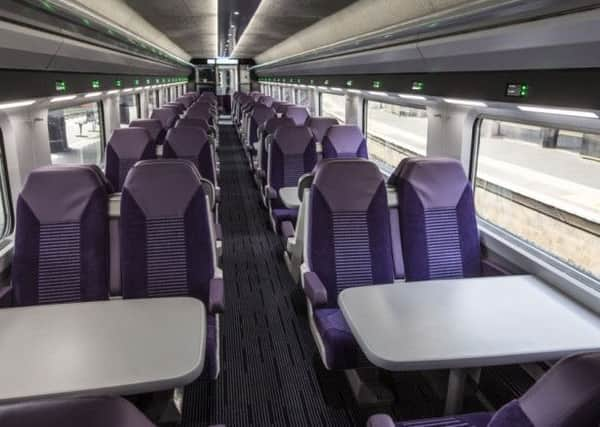Ben Lowry: Last weekend showed why we need drunkenness ban on the Belfast to Dublin train


The article was triggered by two things:
First, the airline Jet2.com had just announced a ban on alcohol before 8am and had said that it would refuse passage to people whom it considers to be drunk.
Second, an elderly man had told me about being on a train up from Dublin with his wife, and how they took refuge in the cafe car due to the drunkenness of GAA fans.
Advertisement
Hide AdAdvertisement
Hide AdThen, last Saturday, almost one year to the day after my article, there was fighting between rival GAA fans on an overcrowded train from Dublin to Belfast.
A passenger is reported to have hit the emergency stop button and Gardai later joined the train. Apparently no-one was arrested.
In other words, no-one will pay the price for this disgraceful episode: a late train, disruption to other rail services, and misery and nervousness to other passengers.
So similar episodes will happen again in the future, as they have done in the past, perhaps less severely.
Advertisement
Hide AdAdvertisement
Hide AdI will not rehearse arguments that I made last year – that article can be read by clicking here.
Suffice to say that I understand all the arguments in favour of a relaxed approach towards enforcing a no drunkenness policy – that people are often just having fun as they return from Ireland’s biggest city, that they might be celebrating after a sporting victory or in high spirits after rock concert or in party mode for some other reason.
There is also the pragmatic matter that preventing large numbers of drunken people getting on to a train could lead to serious disorder, for which rail and station staff are not equipped.
But again and again, in a whole range of spheres of life, we have to remember the consequences of not getting tough with selfish or unacceptable or disruptive behaviour.
Advertisement
Hide AdAdvertisement
Hide AdLast week I was asked on BBC Talkback to be part of a panel discussing a suggestion by the Sinn Fein councillor, Jim McVeigh, that persistently anti social behaviour should lead to families being evicted from social housing.
Whether or not that is a sanction too far is something on which I am undecided, but I welcome the debate.
Years ago, when I was between homes, I briefly lived in a rental property close to Belfast city centre in a street in which a “problem family” lived. The police were out at their house almost every night.
It is simply not acceptable for society only to think about the (admittedly huge) problems that such problem families must have in their lives, and not also think about the immense suffering that they can cause to the perhaps decent, quiet folk who live next door – people who, if they own their house, might be unable to sell it.
Advertisement
Hide AdAdvertisement
Hide AdPeople who suffer years, perhaps decades, of stress and worry due to their troublesome neighbours – neighbours that they are perhaps too frightened to tackle in even the mildest manner.
Clearly brief episodes of rowdiness on a train are not comparable to such long-term misery.
Even so, by taking a non interventionist approach to drunkenness on trains means that over the decades countless people have suffered in silence on long rail journeys so that others can behave as they please.
In a host of walks of life, the failure to tackle things leads to innocent victims.
Advertisement
Hide AdAdvertisement
Hide AdWhen in a workplace some employees are allowed to under perform, it creates an injustice towards hard-working, conscientious people who do perform.
When sports that have a culture of drug abuse do not tackle it, they let down those athletes who spurn performance enhancing substances.
When you turn a blind eye to people who exploit welfare you betray low paid workers who do not rip off the system, and so have a lower quality of life than the cheat.
When you are lenient towards tax or fuel duty evaders, the law abiding taxpayers and fuel buyers have to contribute more.
And so on.
Advertisement
Hide AdAdvertisement
Hide AdBut in all these and other areas of life, ‘decent’ people who are in positions of authority often find it easier to overlook misconduct.
There is no doubt that strictly enforcing a drunkenness ban on the Belfast to Dublin train would be hard.
The only way that I can see it working is if it was made very clear, months in advance, that a zero policy approach would apply from date X.
Then, on that date and for weeks afterwards, certain trains that might attract drunken passengers would, at their departure point, have large scale security teams confiscating alcohol and barring passengers deemed to be drunk.
Police would be on standby.
Advertisement
Hide AdAdvertisement
Hide AdAnd soon enough, the word would go round that there was no point turning up drunk for a long distance train because you will not get on – regardless of whether you react violently to being barred.
• Ben Lowry (@BenLowry2) is News Letter deputy editor
Ben Lowry in 2016: It is time for a drunkenness ban on the Belfast to Dublin train
Ben Lowry: Some thoughts on being an older parent